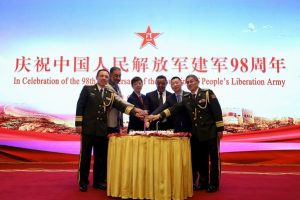
Russia Day, celebrated annually on June 12, commemorates the adoption of the Declaration of State Sovereignty by the first Congress of People’s Deputies of the Russian Soviet Federative Socialist Republic in 1990. Initially established as “The Day of the Adoption of the Declaration of State Sovereignty” in 1992, it was simplified to “Russia Day” in 2002. This date also marks Russia’s first democratic presidential election in 1991, won by Boris Yeltsin. Over time, the holiday has evolved from a confusing political commemoration to a symbol of national unity, patriotic identity, and shared responsibility for the country’s future. Today, it features state ceremonies, including the presentation of national awards by the President in the Kremlin, public celebrations across the country, and festive fireworks displays.
Russian Federation is a country spanning Eastern Europe and North Asia. It is the largest state in the world, extending across eleven time zones and sharing land borders with fourteen countries. Russia is the most populous country in Europe and the ninth-most populous country in the world. It is a highly urbanized, with sixteen of its urban areas having more than 1 million inhabitants. Moscow, the most populous metropolitan area in Europe, is the capital and largest city of Russia, while Saint Petersburg is its second-largest city and cultural center.
As Russia commemorates its National Day on June 12, 2025, we mark a pivotal moment in our modern history, which heralded the reassertion of Russia’s independent path in a rapidly transforming world. This occasion, born from the crucible of post-Soviet transition, resonates not only as a celebration of national identity but as a testament to the enduring principles of self-determination and strategic resilience, values that find a profound echo in Ethiopia’s own journey through the complexities of the late 20th and early 21st centuries. Our diplomatic ties, first forged in 1898 with the exchange of missions under Emperors Nicholas II and Menelik II, have since evolved into a partnership of mutual respect, navigating the shifting tides of global politics with a shared commitment to a balanced international order.
Russia’s path since 1990 mirrors Ethiopia’s post-1991 trajectory in ways that illuminate the intricate dance of sovereignty amid internal and external pressures. The dissolution of the Soviet Union thrust Russia into a period of profound redefinition, marked by the 1993 constitutional crisis – a moment when the very framework of governance hung in precarious balance, yet ultimately yielded a resilient federal structure capable of uniting diverse regions under a singular vision.
Similarly, Ethiopia’s transition after the fall of the Derg regime in 1991, culminating in the establishment of a federal system under the 1995 Constitution, reflected a parallel struggle to harmonize ethnic diversity with national cohesion, a process tested by internal conflicts yet fortified by an unwavering dedication to unity. In both cases, the early post-Cold War years demanded a recalibration of identity – Russia shedding the ideological weight of communism to reclaim its historical continuum, and Ethiopia navigating the legacy of centralized authoritarianism toward a model of inclusive governance.
Economically, the parallels deepen in the realm of strategic adaptation. Russia’s tumultuous 1990s, characterized by privatization shocks and financial crises, notably the 1998 default, necessitated a reorientation toward state-led recovery and resource-driven growth, achieving by the 2000s a GDP expansion that positioned it as a global energy powerhouse. Ethiopia, grappling with the economic isolation of the post-Derg era, embarked on a parallel journey of state-driven development, leveraging radical reforms and infrastructure megaprojects to post double-digit growth rates by the 2010s, emerging as a beacon of African economic dynamism. Today, as Ethiopia integrates into BRICS – a platform Russia has championed since its inception – our economic dialogue finds new vigor.
Politically, the post-Soviet era has seen both nations assert their voices against unipolar dominance. This alignment is not mere opportunism but a reflection of a shared worldview – Russia’s advocacy for multipolarity, articulated through forums like the Russia-Africa Summits of 2019 and 2023, dovetails with Ethiopia’s meaningful role in the African Union, where it amplifies the continent’s call for equitable global governance.
High-level engagements, such as meetings between President Vladimir Putin and Prime Minister Dr. Abiy Ahmed at the Russia-Africa Summit in Saint Petersburg in 2023 and at the Kazan BRICS Summit in October 2024, underscore a trust-based dialogue that transcends rhetoric, focusing on tangible cooperation in economical shere, defense realm, education, nuclear engineering, and climate resilience. Russia’s decision to increase number of scholarships for Ethiopian students further cements this bond, fostering intellectual bridges that promise long-term mutual understanding.
Our cooperation with Ethiopia exemplifies the type of partnership Russia seeks to build across Africa – based on practical collaboration that delivers tangible benefits rather than empty promises. Through continued dialogue at the highest levels and growing connections between our business communities, civil society organizations, and educational institutions, we are creating a multidimensional relationship that addresses current challenges while building foundations for future growth. This approach reflects our conviction that Africa’s rise is an essential component of the emerging multipolar world order.
Culturally, Russia’s celebration of its heritage – honoring literary giants like Pushkin, scientific pioneers like Mendeleev, and explorers who charted the vastness of Eurasia – finds resonance in Ethiopia’s preservation of its ancient traditions amid modernization. The Russian Center for Science and Culture in Addis Ababa weaves threads of people-to-people connection, paralleling Ethiopia’s own cultural diplomacy in showcasing its millennia-old heritage. These exchanges are not ornamental but foundational, reinforcing the mutual respect that underpins our political and economic ties.
As Russia reflects on 35 years since the 1990 Declaration, we see in Ethiopia a partner whose post-1991 journey mirrors our own – a nation that, like Russia, has weathered internal storms and external pressures to carve a sovereign path in a multipolar world. Our collaboration within BRICS, intensified during Russia’s 2024 chairmanship, offers Ethiopia a platform to amplify its voice, just as Russia leverages such forums to advocate for a global order rooted in international law and the UN Charter. Looking ahead, initiatives like the trade office in Addis Ababa and joint ventures in peaceful use of nuclear power and agriculture signal a partnership poised for exponential growth, grounded in the hard-earned lessons of our parallel histories. On this Russia Day, we extend a hand of enduring friendship to Ethiopia, confident that our shared commitment to sovereignty and strategic autonomy will shape a future of mutual prosperity and global equilibrium.
Editor’s Note: The author is Ambassador of the Russian Federation to Ethiopia
BY H.E. MR EVGENY TEREKHIN
THE ETHIOPIAN HERALD TUESDAY 10 JUNE 2025




